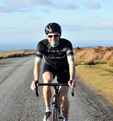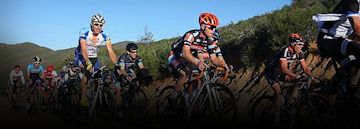One of the most difficult problems that coaches have is persuading athletes to take recovery days, easy weeks and have a few weeks chilling at the end of a season.
I have athletes who, if you told them to do a 12 minute, 28 second and 42 millisecond Zone 4 effort, would follow it to the millisecond if they had a means of timing to that level of granularity. Ask them to take 24 hours rest and they can't seem to follow it!
Athletes who want a coach tend to be motivated and love to be active - I get that. However, I see many athletes seeking my help who have hit the end of the road being self coached and have invariably driven themselves and their performances into the ground with a relentless amount of training volume.
I had a new recruit just recently. She opened her training diary for the first month and commented - wow plenty of rest then! I had prescribed two rest days per week.
I am going to try and explain why recovery is an essential element in your training programme, and why, if you don't respect it, you won't improve and will be wasting your money on a coach or training programme.
The process of creating fitness can be broken down into three periods:
- Training - the workouts in your training diary that you like/feel that you pay for.
- Recovery - the days in your diary that are blank that many of you don't like/don't know why you pay for.
- Supercompensation - the bit that is not in your training diary but is where the magic happens/is exactly what you pay for.
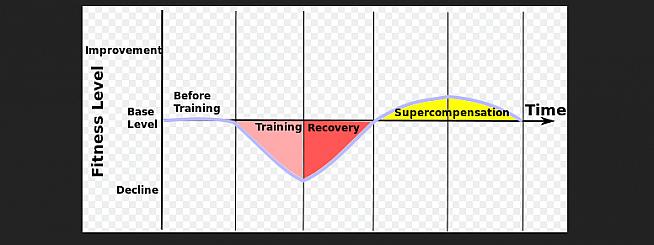
Yes you read that right - TRAINING DECREASES FITNESS
As we train our body starts to accumulate fatigue and is damaged by the increased training load that we have placed on it. After training, the body enters the RECOVERY period during which our level of FITNESS INCREASES up to the base level of fitness.
Yes you read that right - RECOVERY INCREASES FITNESS
Our body is an amazing adaptive organism. Subjecting it to a new stimulus such as training will trigger complex physiological and biological reactions that mean that the increase in FITNESS during the recovery phase will go BEYOND the base fitness level. This is called SUPERCOMPENSATION and is a phase where fitness surpasses the initial fitness level.
This is the bit you are really paying me for right?
Without recovery you won't create the environment for this supercompensation to happen - at best you won't get any better and at worst will slip into full blown overtraining syndrome.
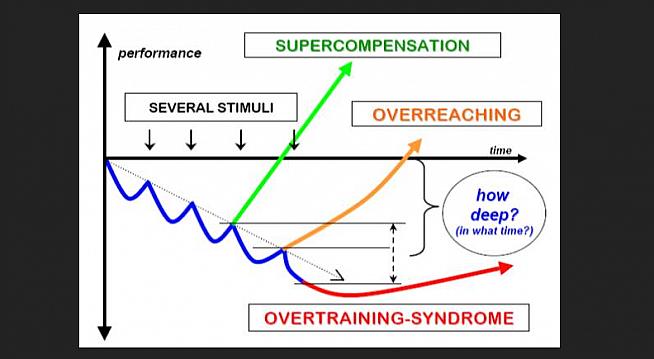
Without recovery we start to overreach and then overtrain. I see plenty of athletes who fall into the first category most of the year.
But it is not just the monthly training cycle that is organised for you to improve your fitness. The weekly cycle is just as important. Three to four days of training back to back creates a decent amount of training stress - remember you are actually becoming LESS FIT during this time. Two recovery days per week are in my view the BARE MINIMUM, especially for masters athletes.
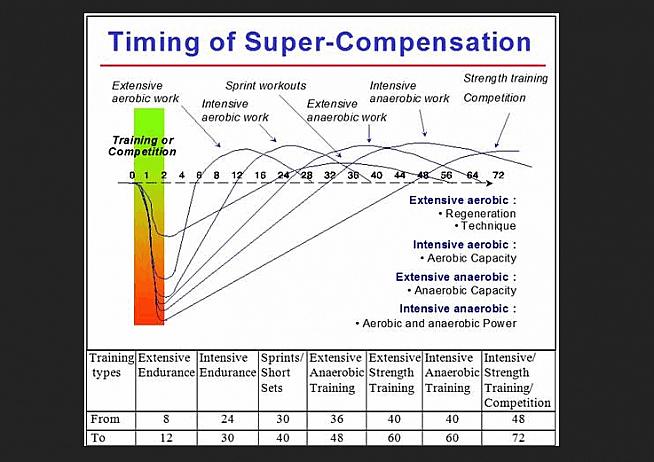
In terms of riding the amount of training stress is determined by a combination of how long and how hard you have ridden. If you use Training Peaks and ride with a heart rate monitor or power meter, you might have noticed a metric called TSS - Training Stress Score. Think of this as a score of the physiological cost of your ride.
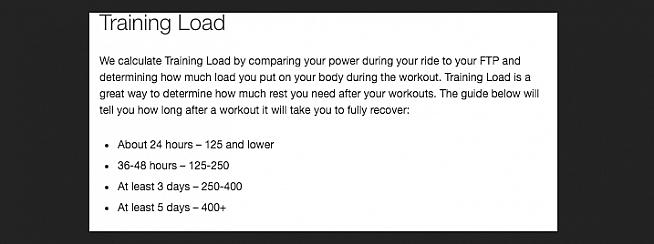
A typical Foundation Training Week might involve four days back to back training, accumulating a TSS of around 350. To fully recover from this will take around two to three days depending on the athlete and how well they manage their recovery process.
Your weekly recovery days and monthly recovery weeks are vital for you to recover and to allow the MAGIC of supercompensation to happen.
So there you have it:
TRAINING DECREASES FITNESS
RECOVERY INCREASES FITNESS (beyond the previous baseline)
DISBELIEF LEADS TO NO IMPROVEMENT, OVERTRAINING & INJURY.
I really understand that accepting this might be a real leap of faith for some of you. But this is not old wives' tales - the basis for these theories are rooted in proper science and research and are practised by professional sportspeople all over the world.
So do yourself a favour - it does not matter if you are paying a coach or are self coached, training without recovery is a total waste of time if you are looking for improved performance. The only difference is if you are paying for a coach you are wasting time and money!
Rob Wakefield is a fully qualified Level 3 Cycling Coach with the Association of British Cycling Coaches and founder of Propello, a cycling focused health and fitness business delivering Performance Training Programmes and Bespoke Coaching to cyclists anywhere in the world.
All cyclists who are looking to improve their speed, endurance or strength will benefit from a structured training programme. Propello Training will improve how your muscles, lungs and heart work and will enable your body to transport and utilise fuel effectively - making you faster and stronger for longer.
Click here to learn more about Propello.
0 Comments

